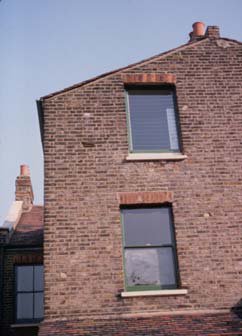
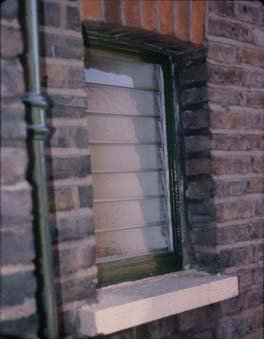
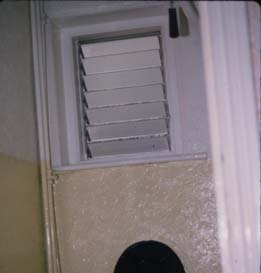
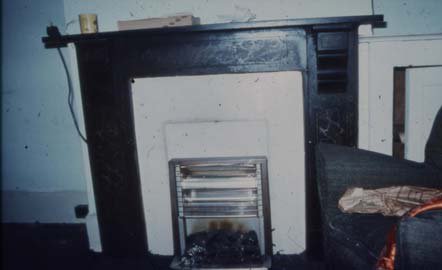
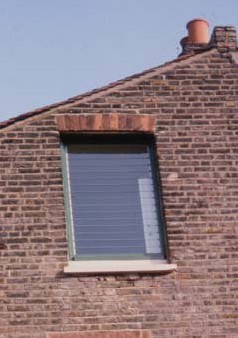
HHSRS VERSION 2
SEPTEMBER 2004
COLD
Persons aged 60 years or over
Damp and Mould Growth
A) Window to kitchen
EXCESS
Vulnerable group
Related hazards
A) Rear windows
B) Living room fire
DESCRIPTION OF HAZARDS
Dwelling:
HHSRS VERSION 2
Multiple locations
Yes
No
Secondary hazards
Yes
No
A) Window to w.c.
A) w.c. window - interior
Converted flat in 1900's end terraced house
LIST OF RELEVANT MATTERS
LIKELIHOOD & OUTCOMES
A
# Secondary hazards
A
a)
Thermal insulation
2
-
None
-
b)
Dampness
-
c)
Settling of insulation
3
d)
Type of heating provision
3
e)
Size of heating system
2
f)
Installation & maintenance
-
g)
Controls to heating system
-
h)
Amount of ventilation
3
Key
3
Seriously defective
I)
Ventilation controls
3
2
Defective
j)
Disrepair to ventilation
-
1
Not satisfactory
k)
Draughts/excess ventilation
3
-
Satisfactory/NA
Background: This large three-storey Victorian house was converted in the 1950's to provide three self-
contained flats, one on each floor. The top floor flat comprises a large living room at the front and a bedroom at
the rear of the main part of the house. The bathroom, a separate w.c. and the kitchen/diner are located in the
long back addition. The loft has 100 mm of insulation.
Windows: Windows to the back addition kitchen, bathroom and w.c. compartment have been replaced with
louvred windows. All other windows are single glazed, double hung sashes.
Heating: The open fireplaces throughout the flat have been sealed. Radiant bar heaters fitted in the front
living/dining room, rear bedroom and in the dining area in the back addition.
A)
B)
A B C D E F G H
I
J
Improved
Average likelihood, outcomes and HHSRS score for excessive cold for persons aged 60
years or more in pre 1920 HMOs and all dwellings, 1997-99.
Score
327
HHSRS VERSION 2
SEPTEMBER 2004
HEALTH AND SAFETY RATING SYSTEM SCORES
Pre 1920 converted s/c Flat
LIKELIHOOD
Low
High
1 in
32
Example
32
42
24
13
7.5
4
2.5
1.5 >
Averages: 340
< 4200 2400 1300 750 420 240 130
75
Justification
OUTCOMES
Class I
Class II
Class III
Class IV
Justification
RATING
With regard to its 9 inch solid brick walls, sash windows in the main part of the block
and generally low standard of loft insulation, the dwelling is typical of many converted
flats of its age. However, due to the presence of only radiant electric fires throughout
the flat and the louvred windows throughout the back addition, the likelihood of the
dwelling becoming unhealthily cold is significantly higher than for the average Pre-1920
dwelling.
%
Averages: 34.0
< 0.05 0.15 0.3
0.7
1.5
3
Av: 6.0
4.6
< 0.05 0.15 0.3
0.7
1.5
3
< 0.05 0.15 0.3
0.7
1.5
3
< 0.05 0.15 0.3
0.7
1.5
3
31.6
7
15
26
7
15
26
Av: 18.0
21.5
7
15
26
31.6
38 >
4.6
38 >
21.5
Likelihood to
1 in 1,000
Outcomes to
31.6 4.6 21.5 42.3 %
Increasing the loft insulation to 250 mm, installing an efficient gas fired central heating
system and replacing the windows throughout with double glazed units would increase
the energy efficiency of the flat substantially and thereby reduce the likelihood of
excessive cold to better than average figures.
38 >
Av: 42.0
42.3
42.3
7
15
26
38 >
Although the risk of the dwelling falling to unhealthily cold temperatures and the
consequent risk of serious harm is higher than average, the spread of harms is not
increased in terms of its severity.
Example
Average: 1000
A B C D E F G H
I
J
Score 10233
RATING SCORES AFTER IMPROVEMENT
Av:1000
IMPROVE
Justification
NEW RATING
Av Nos: